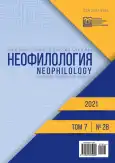Model term formation: aspects and current trends
- Authors: Batyushkina M.V.1
-
Affiliations:
- Legislative Assembly of Omsk Region
- Issue: Vol 7, No 28 (2021)
- Pages: 553-564
- Section: РУССКИЙ ЯЗЫК
- URL: https://journal-vniispk.ru/2587-6953/article/view/302394
- DOI: https://doi.org/10.20310/2587-6953-2021-7-28-553-564
- ID: 302394
Cite item
Full Text
Abstract
We consider the features of model terminology. The purpose of the study is to comprehend and initially describe the specifics of the basic model legislative terms and definitions, aspects and trends of their formulation and use. To achieve this goal, we analyze 157 model acts (13 codes and 144 laws) adopted by the Interparliamentary Assembly of the CIS member states in the period from 2012 to 2021; more than 2000 model terms and definitions. We note that the model term formation is carried out taking into account the established traditions of creating legal acts, the peculiarities of the hierarchical and subject-branch correlation of legislative terms and concepts, as well as understanding the functions, means and methods of formulating legal definitions. Model definitions of terms reflect the typical phenomena of legal discourse of unification, transformation, homonymy, polysemy, synonymy, antonymy of legal concepts, variability of their legal definitions. The methodological basis is formed by general scientific methods and approaches used in modern Russian studies and legal linguistics (analysis, comparison, analogy, modeling, contextual, interpretive, systemic, interdisciplinary and other approaches). The work can be useful to those whose activities are related to the official business sphere of communication, who creates, analyzes and systematizes legal acts, examines the development of legal terminology, the Russian language as the state language of the Russian Federation.
About the authors
M. V. Batyushkina
Legislative Assembly of Omsk Region
Author for correspondence.
Email: soulangeana@mail.ru
ORCID iD: 0000-0003-1472-5953
Candidate of Pedagogy, Consultant of Legal Department; Full Member of the Guild of Linguistic Experts in Documentation And Information Disputes
Russian Federation, 1 Red Way St., Omsk 644002, Russian FederationReferences
- Zaloilo M.V. Operezhayushchiy kharakter pravotvorchestva i problema sinkhronizatsii pravovogo regulirovaniya [Anticipatory nature of law-making and the problem of synchronization of legal regulation]. Zhurnal rossiyskogo prava – Journal of Russian Law, 2019, no. 9, pp. 20-29. (In Russian).
- Kysymzhanova D.S. Vliyaniye model’nykh zakonov na natsional’noye zakonodatel’stvo [Impact of model laws on national legislation]. Vestnik Instituta zakonodatel’stva Respubliki Kazakhstan – Bulletin of Institute of Legislation and Legal Information of the Republic of Kazakhstan, 2012, no. 3 (27), pp. 164-166. (In Russian).
- Lobanov N.A., Lomakina T.Y. Model’nyy zakon «Ob obrazovanii vzroslykh»: iz istorii nepreryvnogo obrazovaniya [Model law on adult education the forerunner of the future law on continuous education in the Russian Federation]. Otechestvennaya i zarubezhnaya pedagogika [Domestic and Foreign Pedagogy], 2019, vol. 1, no. 3 (60), pp. 73-82. (In Russian).
- Malysheva I.V. Rol’ model’nykh zakonov v razvitii sistem zakonodatel’stva sub”yektov RF [The role of model laws in the development of legislative systems of the constituent entities of the Russian Federation]. Sbornik statey Vserossiyskoy nauchno-prakticheskoy konferentsii «Pravovyye problemy ukrepleniya rossiyskoy gosudarstvennosti» [Collection of Works of the All-Russian Scientific and Practical Conference “Legal Problems of Strengthening Russian Statehood”]. Tomsk, 2020, pp. 41-43. (In Russian).
- Saidamirova F.S. Sushchnost’ i osnovnyye zadachi model’nogo zakonodatel’stva Mezhparlamentskoy Assamblei SNG [Model legislation of the Interparliamentary Assembly of the Commonwealth of independent states as a mechanism for regional cooperation]. Izvestiya Instituta filosofii, politologii i prava imeni A. Bakhovaddinova Natsional’noy akademii nauk Tadzhikistana – News of the Institute of Philosophy, Political Science and Law named after A.Bahovaddinov of the Academy of Sciences of the Republic of Tajikistan, 2021, no. 1, pp. 177-182. (In Russian).
- Shestakova E.V. Otlichiye model’nykh aktov ot drugikh edinoobraznykh aktov [Difference of model acts from other uniform acts]. Pravo i gosudarstvo: teoriya i praktika – Law and State: The Theory and Practice, 2006, no. 8, pp. 134-144. (In Russian).
- Batyushkina M.V. Yuridicheskoye ponyatiye i yuridicheskiy termin: osobennosti sootnosheniya i opredeleniy (na materiale rossiyskikh zakonov) [Legal concept and legal term: specificity of the correlation and definitions (based on Russian laws)]. Vestnik Kemerovskogo gosudarstvennogo universiteta – Bulletin of Kemerovo State University, 2020, vol. 22, no. 1 (81), pp. 207-215. (In Russian).
- Saltykov K.G. Yuridicheskiye ponyatiya i terminy: voprosy sootnosheniya i interpretatsii [Legal concepts and terms: the correlation and interpretation]. Vestnik Dal’nevostochnogo yuridicheskogo instituta MVD Rossii [Bulletin of the Far Eastern Law Institute of the Ministry of Internal Affairs of Russia], 2017, no. 4 (41), pp. 5-9. (In Russian).
- Palashevskaya I.V. Yuridicheskiye definitsii: funktsional’nyye i tipologicheskiye kharakteristiki [Legal definitions: functional and typological characteristics]. Vestnik Volgogradskogo gosudarstvennogo univer-siteta. Seriya 2. Yazykoznaniye – Science Journal of Volgograd State University. Series 2. Linguistics, 2017, vol. 16, no. 3, pp. 131-141. (In Russian).
- Belyanskaya O.V. Lingvisticheskiye protivorechiya v sfere zakonotvorchestva i pravoprimeneniya [Linguistic controversy in the sphere of law making and enforcement]. Neofilologiya – Neophilology, 2019, vol. 5, no. 20, pp. 476-482. https://doi.org/10.20310/2587-6953-2019-5-20-476-482 (In Russian).
- Shakhovskiy V.I. Ekologiya kommunikativnoy distributsii slova [Ecology of communicative word distribution]. Neofilologiya – Neophilology, 2021, vol. 7, no. 27, pp. 369-376. https://doi.org/10.20310/2587-6953-2021-7-27-369-376 (In Russian).
Supplementary files









